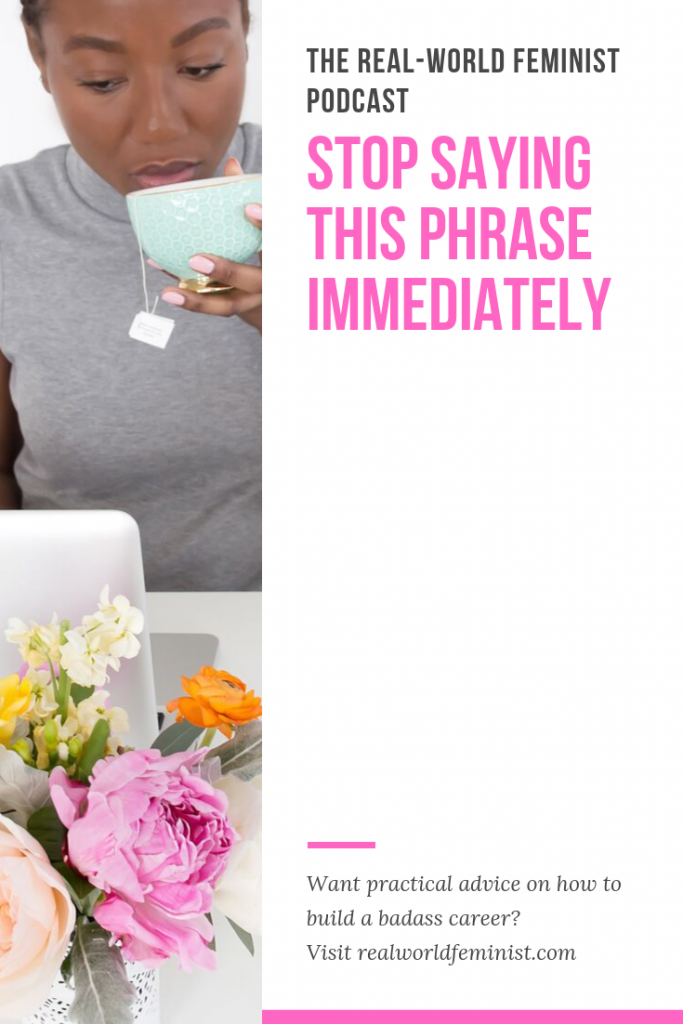
Episode #18: Stop Saying This Phrase Immediately
Listen up, Real-World Feminists!
There is a phrase that I want you to stop saying in the workplace immediately.
I’m sorry.
If you are a woman in the workplace, I am willing to bet that you say “I’m sorry” WAY TOO OFTEN.
I’m guilty of it, too.
I still need to make a conscious effort to edit these words out of my everyday business language.
Look, we are working against thousands of years of cultural conditioning here. Women have been taught to apologize. It’s ingrained in us. It’s time to become more aware of how we use our words in the workplace.
Obviously, I’m not talking about eliminating basic human courtesy. If you accidentally step on someone’s foot or slam a door in their face, a good “I’m sorry” is certainly called for.
If you take an honest look and listen to how you are communicating with colleagues, I’m willing to bet that you will see that you say “I’m sorry” A LOT.
I’m also willing to bet that you actually don’t have anything to genuinely apologize for when you say “I’m sorry.”
The Merriam-Webster dictionary defines the word “sorry” in three ways:
- Feeling sorrow, regret, or penitence
- Mournful, sad
- Inspiring sorry, pity, scorn, or ridicule
Are you really feeling sorrow or penitence over the fact that you can’t make a meeting at the time someone is suggesting?
Or do you have a genuine conflict that can’t be moved?
Do you see what I’m saying here? Stop freaking apologizing for things you shouldn’t apologize for!
Here are the three most common ways women unnecessarily apologize in the workplace, along with alternative language replacements to try for yourself.
Apologizing for Scheduling Conflicts
You get a meeting request for a time that you have a conflict.
How often do you say “I’m sorry, but that time doesn’t work for me” in response?
Instead of starting with “I’m sorry” simply state “I’m unavailable at this time” and suggest an alternative time.
Before you quickly respond back with that email response to that invite, pause a beat. Did you automatically apologize in that reply? Take a moment to edit your response before you send it back.
Apologizing for Communication Disconnects
You receive an email with a long-winded explanation. That makes no sense. Or has missing pieces of key information.
How often do you start your reply back with, “I’m sorry, I don’t understand” or “I’m sorry, can you clarify…”?
Why are you apologizing for not understanding someone else’s poor communication?
Instead of softening your reply with an unnecessary “I’m sorry”, cut to the “please clarify” request.
The words “I’m sorry” are purely superfluous in this situation. They don’t make anyone feel better. Cut to the chase and ask for clarification.
Apologizing for Standard Business Conflict
Ladies, we need to get comfortable with basic business conflict. Healthy conflict and disagreements are necessary for healthy businesses. We can’t agree with each other all of the time. It’s not good for business!
Stop apologizing for disagreeing with another person.
Instead of “I’m sorry, but I think…”—try “I hear you, but let me explain why I disagree with your point.”
You were hired because you have a brain. Don’t apologize for using it.
I challenge you to think about your male colleagues and how often you hear apologizing in these same situations.
It’s not much, is it?
Words matter.
Stop chipping away at yourself by apologizing for things you simply shouldn’t apologize for.
Subscribe & Review in iTunes
Hey, sis. Have you subscribed in iTunes yet? I’m cooking up all of this stuff to help you succeed in your career and life—I don’t want you to miss any little bit! Click here to subscribe in iTunes.
If you have found my content to be helpful, I would be so grateful if you would leave a 5-star review on iTunes. Reviews help the podcast get found by other Real-World Feminists! Please help me spread the word.